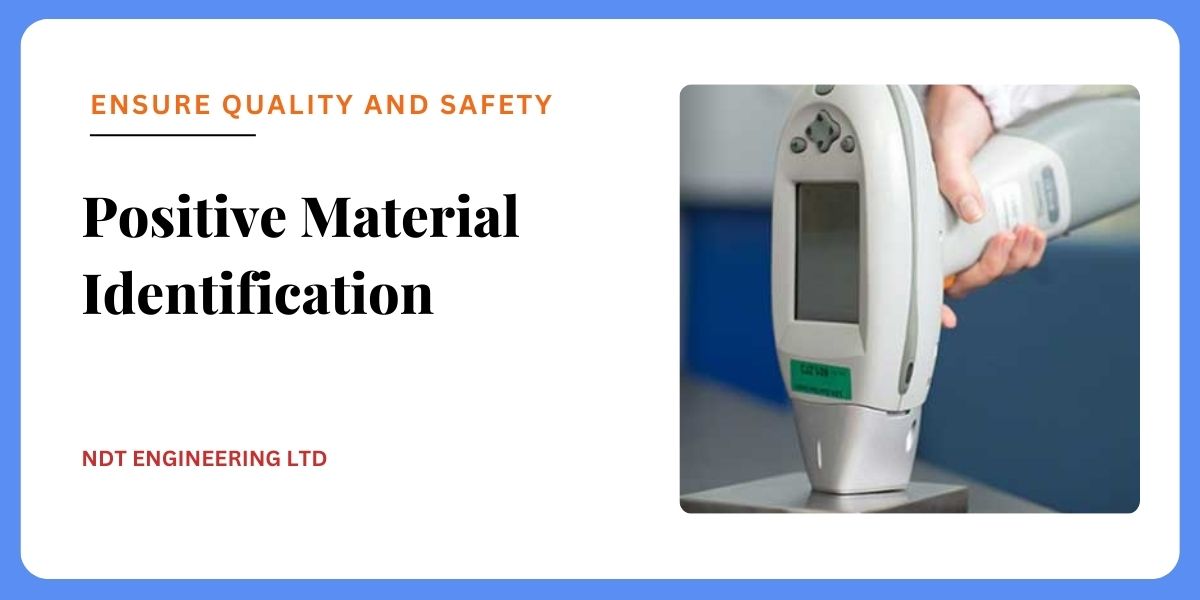What is Positive Material Identification (PMI)?
Positive Material Identification (PMI) is a non-destructive testing (NDT) method used to analyze the chemical composition of metallic alloys. PMI is crucial for confirming that the material meets the specified alloy grade and ensuring that the correct material is used in critical applications. The most common techniques for PMI include X-ray fluorescence (XRF) and optical emission spectroscopy (OES).
X-ray Fluorescence (XRF)
XRF is a rapid and non-destructive analytical technique used to determine the elemental composition of materials. When the material is exposed to X-rays, it emits secondary (fluorescent) X-rays that are characteristic of the elements present. The XRF analyzer detects these X-rays and identifies the elements and their concentrations.
Optical Emission Spectroscopy (OES)
OES involves striking the material with a spark or arc, which excites the atoms in the material. These excited atoms emit light at characteristic wavelengths, which are then measured to determine the material's elemental composition. OES is highly accurate and is used for analyzing a broader range of elements, including carbon, which XRF cannot detect.
How Does Positive Material Identification Work?
PMI involves a series of steps to ensure accurate material verification:
- Sample Preparation: The surface of the material is cleaned to remove any contaminants that could interfere with the analysis.
- Material Analysis: Using either XRF or OES, the equipment is positioned on the material's surface, and the analysis is conducted. The equipment reads the elemental composition of the material and compares it to the specified alloy grade.
- Data Interpretation: The data obtained from the analysis is interpreted to verify that the material matches the required specifications. If any discrepancies are found, further investigation or corrective actions may be necessary.
- Reporting: A detailed report is generated, outlining the findings and confirming whether the material meets the specified requirements.
Applications in Tanzanian Industries
Oil and Gas
In Tanzania's oil and gas industry, PMI is essential for verifying the material composition of pipelines, valves, flanges, and other critical components. Ensuring that the correct materials are used is vital for preventing failures and ensuring the safe operation of the infrastructure.
Construction
In the construction industry, PMI is used to verify that the structural steel and other metal components meet the required specifications. This ensures that buildings, bridges, and other structures have the necessary strength and durability to withstand environmental and load-bearing conditions.
Manufacturing
Manufacturing industries use PMI to ensure that raw materials and finished products meet the required material specifications. This is crucial for maintaining product quality, performance, and safety.
Aerospace
In the aerospace industry, PMI is used to verify the material composition of aircraft components, ensuring they meet the strict safety and performance standards required for flight operations.
Benefits of Positive Material Identification
- Ensures Material Compliance: PMI verifies that the materials used in critical applications comply with the specified standards and regulations, reducing the risk of material failure.
- Prevents Material Mix-Ups: PMI helps in preventing material mix-ups during production, ensuring that the correct materials are used for the intended purpose.
- Enhances Safety: By verifying that materials meet the required specifications, PMI enhances the safety and reliability of industrial components and structures.
- Non-Destructive: PMI is a non-destructive method, meaning it does not damage or alter the material being tested, allowing for continued use of the component after testing.
- Quick and Accurate: PMI provides quick and accurate results, allowing for immediate decision-making and reducing downtime in industrial operations.
NDT Engineering Ltd: Your Partner in Positive Material Identification
NDT Engineering Ltd is a trusted NDT agency in Tanzania, offering comprehensive NDT services including Positive Material Identification. Our team of certified professionals uses state-of-the-art equipment and follows stringent safety protocols to deliver precise and reliable material verification. By partnering with us, Tanzanian industries can ensure the integrity and compliance of their materials and components.
Frequently Asked Questions
- What materials can be tested using Positive Material Identification? PMI can be used to test a wide range of metallic alloys, including stainless steel, carbon steel, aluminum, and titanium. The appropriate PMI technique is selected based on the material type and the elements to be analyzed.
- Is Positive Material Identification safe? Yes, Positive Material Identification is safe when conducted by trained professionals following strict safety protocols. At NDT Engineering Ltd, we prioritize safety and ensure all necessary precautions are taken.
- How long does a PMI test take? The duration of a PMI test depends on the material and the technique used (XRF or OES). However, most tests can be completed quickly, providing immediate results.
- Can PMI detect all elements in a material? PMI using XRF is effective for detecting a wide range of elements, but it may not detect lighter elements like carbon. OES is recommended for a broader range of elements, including carbon, and provides more detailed analysis.
- Why choose NDT Engineering Ltd for PMI services? NDT Engineering Ltd offers extensive experience, certified professionals, and state-of-the-art equipment. Our commitment to quality and safety ensures accurate and reliable PMI results, making us a trusted partner in Tanzania's industrial sector.
- What industries benefit the most from Positive Material Identification? Industries such as oil and gas, construction, manufacturing, and aerospace benefit significantly from PMI. This method ensures the integrity, compliance, and safety of critical materials and components within these sectors.
Conclusion
Positive Material Identification is a crucial non-destructive testing method that plays a vital role in ensuring the material integrity and compliance of industrial components in Tanzania. NDT Engineering Ltd is dedicated to providing top-quality NDT services, utilizing advanced PMI technology to meet the growing demands of Tanzania's industrial sector. By ensuring thorough and accurate material verification, we help maintain the structural integrity and performance of essential infrastructure.
Discover how our comprehensive NDT services can help you better understand who we are and what we can do for your business.
We offer a range of excellent services tailored to your needs.
Contact us now to find out more and get started!
Contact Now for More Information
